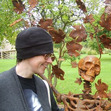Susan Maxwell's Blog, page 6
June 23, 2023
Five For Friday #1: Film Adaptations of Books (a)
A few years ago, I tried to get my social media activities on the road, but didn't put enough fuel in the tank to get very far. One of the features I started to run in my blog was 'Five For Friday', where I would post a list of five linked items each Friday—the theme was often related to writing and books, but it might have just been random or whimsical thoughts that caught my fancy in an idle moment.
I enjoyed putting these lists together, so I've decided to take the concept out of suspended animation. In some cases, I'll give an expanded version of my 'take' on the topic in my end-of-month newsletter (follow the link at the end of this post to subscribe).
So, to start the ball rolling: a list of five outstanding film adaptations of literary works.
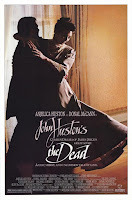
1. The Dead (Dir. John Huston, 1987), adapted from the short story of the same name in James Joyce's collection Dubliners (1904). It was Huston's last film—he died in the year of its release.

2. Babette's Feast (Dir. Gabriel Axel, 1987), from the short story of the same name in the collection Anecdotes of Destiny (1958) by Karen Blixen, writing as Isak Dinesen.
I always think of these two films as a sort of diptych of perfection. It is a pretty extraordinary coincidence that two such exquisite gems—each in its own right a one-in-a-thousand masterpiece—were released in the same year. Both films are remarkably faithful in spirit, and largely also literally, to the original stories: even the slight divergences (more in The Dead than Babette's Feast) are noticeable only to those familiar with the written works.
These are films in which nothing much happens, yet everything happens; and the casts put in magnificent, perfectly judged, ensemble performances.
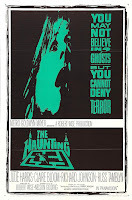
3. The Haunting (Dir. Robert Wise, 1963), from the novel The Haunting of Hill House (1959) by Shirley Jackson.
Although this film—inevitably, adapted as it was from a novel rather than a short story—left out more of its source text than the previous two, it did so in a way that did not traduce the original narrative or, even more importantly, its eerie affect. Despite the fact that the haunting presence is never seen, the film contains one of the scariest scnes ever committed to celluloid.

4. The Innocents (Dir. Jack Clayton, 1961), from the novella The Turn of the Screw (1898) by Henry James.
Of my five choices, this is probably the least close of five to the original text in one sense—the equivalent of James's elliptical narrative voice would never have made it into a mainstream film. Nor does it quite maintain the perfectly balanced ambiguity as to the reality of the supernatural events experienced. It features two exceptionally sinister children, the young boy in particular, who bring a real weirdness to the film.
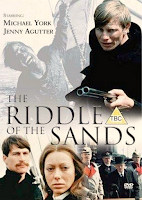
5. The Riddle of the Sands (Dir. Tony Maylam, 1979), from the 1903 novel of the same name by Erskine Childers.
To wrap up, a ripping yarn—a straightforward adventure tale lifted out of the ordinary by the deep love of sailing and the sea that pervades the narrative and effectively constitutes a main character in itself. Despite being a spy thriller, both the book and the film are characterized by a leisurely pace; part of what makes the film such a good adaptation is that it resists the temptation to ramp up the action, and instead allows it to unfold at a rate dictated by the shifting currents and fogs the heroes must navigate.
I have watched these films many times, more often than I have read their literary sources: it's easier to set aside the hour and a half needed for watching, for one thing. And one is far less likely to spill a mug of tea or cocoa into the DVD player than on a book…

WEBSITE www.biblioref.com
FOLLOWSign up to the Newsletter for extra updates and offersMastodon Twitter LibraryThing Goodreads Facebook Instagram YouTube
BUY the BOOKSHollowmen Fluctuation in Disorder And the Wildness A Wild Goose Hunt Good Red Herring
Bibliothèque des Refusés is the imprint of independent author and scholar Susan Maxwell.

Five For Friday #1: Film Adaptations of Books. (a) The Good
A few years ago, I tried to get my social media activities on the road, but didn't put enough fuel in the tank to get very far. One of the features I started to run in my blog was 'Five For Friday', where I would post a list of five linked items each Friday—the theme was often related to writing and books, but it might have just been random or whimsical thoughts that caught my fancy in an idle moment.
I enjoyed putting these lists together, so I've decided to take the concept out of suspended animation. In some cases, I'll give an expanded version of my 'take' on the topic in my end-of-month newsletter (follow the link at the end of this post to subscribe).
So, to start the ball rolling: a list of five outstanding film adaptations of literary works.

1. The Dead (Dir. John Huston, 1987), adapted from the short story of the same name in James Joyce's collection Dubliners (1904). It was Huston's last film—he died in the year of its release.

2. Babette's Feast (Dir. Gabriel Axel, 1987), from the short story of the same name in the collection Anecdotes of Destiny (1958) by Karen Blixen, writing as Isak Dinesen.
I always think of these two films as a sort of diptych of perfection. It is a pretty extraordinary coincidence that two such exquisite gems—each in its own right a one-in-a-thousand masterpiece—were released in the same year. Both films are remarkably faithful in spirit, and largely also literally, to the original stories: even the slight divergences (more in The Dead than Babette's Feast) are noticeable only to those familiar with the written works.
These are films in which nothing much happens, yet everything happens; and the casts put in magnificent, perfectly judged, ensemble performances.

3. The Haunting (Dir. Robert Wise, 1963), from the novel The Haunting of Hill House (1959) by Shirley Jackson.
Although this film—inevitably, adapted as it was from a novel rather than a short story—left out more of its source text than the previous two, it did so in a way that did not traduce the original narrative or, even more importantly, its eerie affect. Despite the fact that the haunting presence is never seen, the film contains one of the scariest scnes ever committed to celluloid.

4. The Innocents (Dir. Jack Clayton, 1961), from the novella The Turn of the Screw (1898) by Henry James.
Of my five choices, this is probably the least close of five to the original text in one sense—the equivalent of James's elliptical narrative voice would never have made it into a mainstream film. Nor does it quite maintain the perfectly balanced ambiguity as to the reality of the supernatural events experienced. It features two exceptionally sinister children, the young boy in particular, who bring a real weirdness to the film.

5. The Riddle of the Sands (Dir. Tony Maylam, 1979), from the 1903 novel of the same name by Erskine Childers.
To wrap up, a ripping yarn—a straightforward adventure tale lifted out of the ordinary by the deep love of sailing and the sea that pervades the narrative and effectively constitutes a main character in itself. Despite being a spy thriller, both the book and the film are characterized by a leisurely pace; part of what makes the film such a good adaptation is that it resists the temptation to ramp up the action, and instead allows it to unfold at a rate dictated by the shifting currents and fogs the heroes must navigate.
I have watched these films many times, more often than I have read their literary sources: it's easier to set aside the hour and a half needed for watching, for one thing. And one is far less likely to spill a mug of tea or cocoa into the DVD player than on a book…

WEBSITE www.biblioref.com
FOLLOWSign up to the Newsletter for extra updates and offersMastodon Twitter LibraryThing Goodreads Facebook Instagram YouTube
BUY the BOOKSHollowmen Fluctuation in Disorder And the Wildness A Wild Goose Hunt Good Red Herring
Bibliothèque des Refusés is the imprint of independent author and scholar Susan Maxwell.

Five For Friday #1
A few years ago, I tried to get my social media activities on the road, but didn't put enough fuel in the tank to get very far. One of the features I started to run in my blog was 'Five For Friday', where I would post a list of five linked items each Friday—the theme was often related to writing and books, but it might have just been random or whimsical thoughts that caught my fancy in an idle moment.
I enjoyed putting these lists together, so I've decided to take the concept out of suspended animation. In some cases, I'll give an expanded version of my 'take' on the topic in my end-of-month newsletter (follow the link at the end of this post to subscribe).
So, to start the ball rolling: a list of five outstanding film adaptations of literary works.

1. The Dead (Dir. John Huston, 1987), adapted from the short story of the same name in James Joyce's collection Dubliners (1904). It was Huston's last film—he died in the year of its release.

2. Babette's Feast (Dir. Gabriel Axel, 1987), from the short story of the same name in the collection Anecdotes of Destiny (1958) by Karen Blixen, writing as Isak Dinesen.
I always think of these two films as a sort of diptych of perfection. It is a pretty extraordinary coincidence that two such exquisite gems—each in its own right a one-in-a-thousand masterpiece—were released in the same year. Both films are remarkably faithful in spirit, and largely also literally, to the original stories: even the slight divergences (more in The Dead than Babette's Feast) are noticeable only to those familiar with the written works.
These are films in which nothing much happens, yet everything happens; and the casts put in magnificent, perfectly judged, ensemble performances.

3. The Haunting (Dir. Robert Wise, 1963), from the novel The Haunting of Hill House (1959) by Shirley Jackson.
Although this film—inevitably, adapted as it was from a novel rather than a short story—left out more of its source text than the previous two, it did so in a way that did not traduce the original narrative or, even more importantly, its eerie affect. Despite the fact that the haunting presence is never seen, the film contains one of the scariest scnes ever committed to celluloid.

4. The Innocents (Dir. Jack Clayton, 1961), from the novella The Turn of the Screw (1898) by Henry James.
Of my five choices, this is probably the least close of five to the original text in one sense—the equivalent of James's elliptical narrative voice would never have made it into a mainstream film. Nor does it quite maintain the perfectly balanced ambiguity as to the reality of the supernatural events experienced. It features two exceptionally sinister children, the young boy in particular, who bring a real weirdness to the film.

5. The Riddle of the Sands (Dir. Tony Maylam, 1979), from the 1903 novel of the same name by Erskine Childers.
To wrap up, a ripping yarn—a straightforward adventure tale lifted out of the ordinary by the deep love of sailing and the sea that pervades the narrative and effectively constitutes a main character in itself. Despite being a spy thriller, both the book and the film are characterized by a leisurely pace; part of what makes the film such a good adaptation is that it resists the temptation to ramp up the action, and instead allows it to unfold at a rate dictated by the shifting currents and fogs the heroes must navigate.
I have watched these films many times, more often than I have read their literary sources: it's easier to set aside the hour and a half needed for watching, for one thing. And one is far less likely to spill a mug of tea or cocoa into the DVD player than on a book…

WEBSITE www.biblioref.com
FOLLOWSign up to the Newsletter for extra updates and offersMastodon Twitter LibraryThing Goodreads Facebook Instagram YouTube
BUY the BOOKSHollowmen Fluctuation in Disorder And the Wildness A Wild Goose Hunt Good Red Herring
Bibliothèque des Refusés is the imprint of independent author and scholar Susan Maxwell.

June 19, 2023
I get to talk about my SPFBO9 entry, 'And the Wildness'
"Hello and welcome! My name is Dom, and I provide professional proofreading services to self-published and indie authors. I also run a YouTube channel where I make SFF book content including reviews and a monthly showcase where indie authors can talk about their own books."
In this manner, an excellent friend of indie authors introduces himself to the world on his website. This week, I am one of the fortunate authors being given the opportunity to introduce their entry for this year's Self-Publishing Fantasy Blog-Off, run by the inestimable Mark Lawrence.
 Presenting myself and And the Wildness to the unforgiving eye of the camera was a bit nerve-wracking—I've done plenty of work presentations, given a couple of academic papers, and done a few readings, but nothing so much in the public eye as this. And amidst such a wealth of authorial talent, as well: it was a real pleasure to hear the other 'showcasees' talking about their books.
Presenting myself and And the Wildness to the unforgiving eye of the camera was a bit nerve-wracking—I've done plenty of work presentations, given a couple of academic papers, and done a few readings, but nothing so much in the public eye as this. And amidst such a wealth of authorial talent, as well: it was a real pleasure to hear the other 'showcasees' talking about their books.
All of Dom's reviews and other book-related videos are available on his YouTube Channel.

WEBSITE www.biblioref.com
FOLLOWSign up to my Newsletter for extra updates and offersMastodon Twitter LibraryThing Goodreads Facebook Instagram YouTube
BUY the BOOKSHollowmen Fluctuation in Disorder And the Wildness A Wild Goose Hunt Good Red Herring
Bibliothèque des Refusés is the imprint of independent author and scholar Susan Maxwell.

June 15, 2023
May Newsletter, fashionably late
Greetings from the writer's lair!
I've been meaning to post a few updates, but have been overtaken by events. There's been my return to the day job after a few weeks' leave. There's the recalcitrance of my work-in-progress, A Wild Goose Hunt, under siege from zombie hordes of supposedly dead-and-buried editing issues. And now I'm told that we're nearly out of tea and will have to ration it until the Big Shop on Saturday… it's hard being an author; hard, I tell you!
Anyway, the updates. To keep things ticking over, I'm going to present the May newsletter as a month's worth of blog musings to date. It's a slightly trimmed-down version of the Subscriber's Newsletter, so if you're a subscriber, you don't have to click through (unless you you find my deathless prose so entrancing that you feel impelled to read it once again).
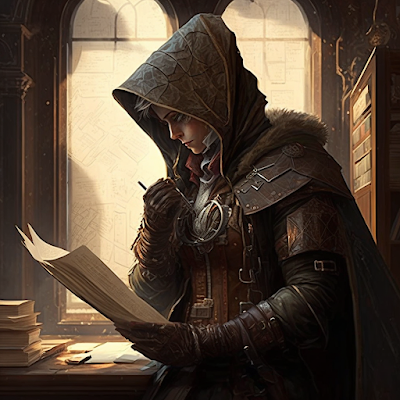
What you'll find inside mostly compsrises:
The 'official' launch of the Bibliothèque des Refusés imprint on 27th May, achieved online with a group of my lovely and supportive writing and publishing friendsHaving my novel And the Wildness accepted as an entrant for SPFBO, the Self-Published Fantasy Blog-OffA bit on my work in progressEvents I have attended or hope to attend
So here it is, a mere click away. I hope you find something to enjoy in it all.

WEBSITE www.biblioref.com
FOLLOWSign up to the Newsletter for extra updates and offersMastodon Twitter LibraryThing Goodreads Facebook Instagram YouTube
BUY the BOOKSHollowmen Fluctuation in Disorder And the Wildness A Wild Goose Hunt Good Red Herring
Bibliothèque des Refusés is the imprint of independent author and scholar Susan Maxwell.

April 23, 2023
Introduction: Interview with an author
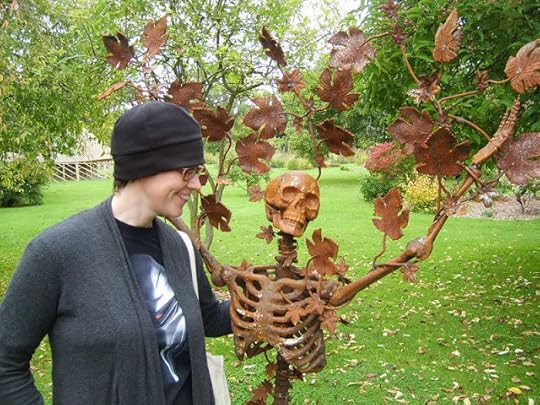
Who are you?
I am Susan Maxwell, an author who dreams of one day having a readership that outnumbers family members.
Tell us about your writing.Some of my writing is fantasy (especially those works accessible to younger readers), and some Gothic, but the terms I feel most at home with, and am particularly interested in exploring, are slipstream and irreal. Both terms refer to a sensibility rather than particular genres or tropes; a sensibility of otherness, of defamiliarization, and disruption. Irreal (at least, according to The Café Irreal) adds to these characteristics the rejection of realistic characters, and a preference for undermining reality over resolving the story. Both slipstream and irreal cite some of the same authors as influential or canonical—Franz Kafka, Jorge Luis Borges, and Clarice Lispector. The Café Irreal also includes Kobo Abe, while a 2007 Readercon panel drafted a “working canon” of 115 slipstream writings, including works by Thomas Pynchon, Italo Calvino, Shirley Jackson, Virginia Woolf, and Ursula le Guin.
I also write poetry, and some non-fiction. The non-fiction includes book reviews (e.g., via BookSirens, or for Inis, the magazine published by Children’s Books Ireland), and some academic work. I was awarded my PhD in 2017; my thesis examined the conceptualisation of ‘marginality’ in archival theory. I research independently, and my areas of interest are broadly connected to the relationships between the archives and literature, and concepts of the archives, of margins, and ‘the other’ in literature, especially fantasy or irreal, and predominantly—though not exclusively—in the Modernist and late Modernist era.
And I also engage in literary and critical activties other than actually writing. For the past couple of years, I have been a member of juries (both fiction and non-fiction) for the British Fantasy Awards. It was a great opportunity to read new writing. I learned a lot from the process, and really enjoyed the change of scenery from peaceful isolation to engagement with like-minded, well-informed fellow panellists. *More of this sort of thing in the future*
How long have you been writing?The first thing I recall wanting to be was an illustrator. Actually, really I wanted to be Sherlock Holmes, but even I could see certain difficulties there, so as second best, I wanted to create worlds by drawing them. I did not attempt to pursue art as a career (mainly because I suspected that I would end up being a teacher, which would not have been good for anyone involved), and realized that I was far more likely to master the skills for writing.
The first thing I recall writing was a school story, when I was about twelve, because I was in bed with some illness and was bored. A sibling, who also writes, was very kind about it, though I remember my mother saying rather faintly that there were an awful lot of characters in it, so I set fire to the school and killed off about a dozen.
I wrote my first full-length book when I was about fourteen—a time-slip adventure involving a character who was brought back, by means of a radio and a card-game, to World War One, where they had to … I don’t know, rescue someone, but why or from what threat, I can’t remember. Someone got killed in a plane crash. And then one of the historical characters travelled forward in time. It was called A Foreign Country, from the L.P. Hartley quotation about the past being a foreign country. I did illustrations for it, too, but I don’t think they survived.
I wrote a lot of poetry in my twenties, and my enthusiasm for ‘the book as material artefact’ was enormously satisfied when another sibling typed them all up (deserving two medals for negotiating my handwriting, which was even worse then than it is now) and had it spiral-bound. I was so pleased with it, I kept taking it out and looking at it.
Why are you setting up this blog?Only so much can go into the books, and I have always been attracted to ways in the which literary worlds can be extended, to what you might call paratexts. The blog will be a paratext for the secondary worlds presented in my books, but also for the processes of creation—the influences and decisions that are precursors to the finished, polished, end result, whether written or painted. It takes a while for potentiality to be filtered into decisions about what I will create. Very often I will write a pretty awful first draft, with the intention of creating only the roughest approximation of what needs to be said, and then leave it for a while, so I can think about it. It is an interesting, if frustrating, process, and I would like somewhere to put at least some of it.
Why independent publishing?On the day that I started writing this post, I received a book from Galley Beggar Press. It was Toby Litt’s A Writer’s Diary. The bookmarks that accompanied it were very a propos: “How do you know the voice of doubt isn’t bang on? You don’t.” “How do you know your agent doesn’t make bleugh faces to their assistant when you’re on the phone? You don’t.” “So, do you stop all this nonsense right now? Do you quit? You don’t.”
I have been creatively productive for a long time now, and have been submitting the results to publishers, exhibition-curators, and competitions for a long time, too. This was partly an impulse to get recognition, or to join particular kinds of conversations, or—like buying a lottery ticket—to have the outside chance of making a living from it (music to the ears of someone whose preferences require independent wealth, but whose bank account begs to differ). Every now and then something would be accepted, but mostly things were rejected.
Independent publishing is not just an alternative to traditional options that are not available for whatever reason. It is at once a gesture of resistance, and a gesture of faith. It offers resistance to all the factors that have led to a particular writer being out of tune with the industry; resistance to an economic ideology that devalues everything that cannot be reduced to monetary exchange; resistance to profit-driven publishing that leaves little space for the sort of quality-driven publishers who re-mortgage their houses to realize their vision, and lie awake worrying about the rising price of paper.
Independent author-publishing is also a gesture of faith in one’s own writing, as something intrinsically important. If ‘the mighty oak was once a little nut that stood its ground’, then the independently published book is a monument to an individual’s insistence on making meaning in a possibly meaningless world, and a two-fingered salute to a political environment fundamentally hostile to creativity for its own sake.
And your publishing name?In 1863, the Paris Salon rejected so many paintings submitted for its annual exhibition that the artists—including Manet and Whistler—and their supporters protested. Emperor Napoléon III ordered that the rejected paintings be exhibited elsewhere in the same building, in a Salon des Refusés, the “room of rejections”. The Impressionists reused the ‘Salon des Refusés’ several times subsequently for their own exhibitions, and many—though not all—had successful careers outside of the official Salon.
Hence, the Bibliothèque des Refusés.
So, these books of yours—what are they? Where can I buy them?Well, the short story collection Fluctuation in Disorder and the novel Hollowmen are slipstream works aimed at an adult rather than a universal readership. The former is available as both e-book and paperback, but the latter only in print, as it contains passages that rely on visual formatting that could not be modified to work with reflowable text.
My three novels set in the fictional 'Hibernia Altera' universe are suitable for anyone who can read them. Good Red Herring (published by Little Island) and A Wild Goose Hunt are part of a series, The Muinbeo Chronicles, set mainly in the rather 'otherworldly' land of Muinbeo, which borders on the imaginary Ireland of And the Wildness, the first of the Flux Avellana series. These are all available as e-books and paperbacks.
The best place to get further details of the books themselves and where you can buy them is on my website. Where you can also find out a bit more about me and what I am up to, if you are so inclined…



Introduction: My books
The first quarter of 2023 may seem to have been a phenomenally prolific period for me, with three books already on the market and a fourth nearly over the finishing-line. However, this is a mirage of the publication rather than the creative process: I was not spending the years between 2014, when Good Red Herring came out, and the present year in a sorry state of writer's block. And I also need to firmly disillusion any reader expecting a book a month from the pen of an author much given to reflection and revision. Anyway, here they all are.
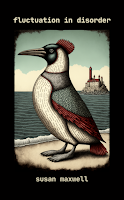
Fluctuation in Disorder
An encounter with an alien enemy. A strange epiphany in a fog-bound park. A collector of the names of the dead faces their own death. Rebel divinities respond to the prayers of despairing creation for deliverance. Bureaucrats find their grip on reality dissolving in odd ways.
Buy this book, or find out more
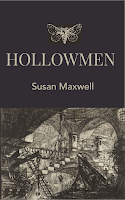
Hollowmen
Stranded in Quettopolis, the capital of Bakhtinstan, Cuffe spends her days surviving the destabilized city, distributing her writing through the ancient Forest, and recollecting her last job as a ‘corporate orator’.
Buy this book, or find out more
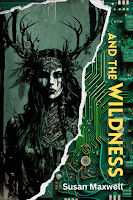
And the Wildness
Villa Grace is in disgrace. Her expulsion from school has ruined the prospect of a family holiday in imperial Byzantium, where her mother is organising a conference. Two of her three siblings are barely speaking to her, as all four face into a ‘holiday’ sweltering on Cobwell Farm in the back of beyond of drought-stricken Hibernia.
Buy this book, or find out more

A Wild Goose Hunt
As a good Sombrist, Hunter Sessaire is aware that not only lying, but also curiosity, is very much frowned upon by his community. As an apprentice archivist, he cannot resist the temptation to try to puzzle out how a manuscript could have been stolen from the room within the Sombrists' stronghold known as the Labyrinth, which opens only during a planetary alignment. An alignment that had not yet taken place.
Buy this book, or find out more
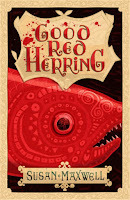
Good Red Herring(Muinbeo Chronicles #1) Published by Little Island
“Some of these stories really started decades, generations, ago, and now come to their close. New things begin to arise from the past, like phoenix feathers separating from the flame. The winding down of the old stories and the starting of the new arose from a death; a murder, if you will believe such wickedness.”
Fen Maguire has been stabbed and the investigation into her death lifts the lid on more than just the name of her killer…
Buy this book, or find out more
